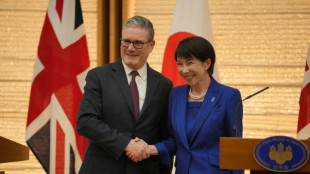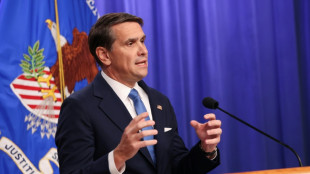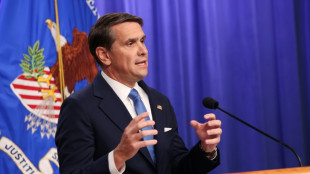
-
 Separatist attacks in Pakistan kill 21, dozens of militants dead
Separatist attacks in Pakistan kill 21, dozens of militants dead
-
'Malfunction' cuts power in Ukraine. Here's what we know

-
 Arbeloa backs five Real Madrid stars he 'always' wants playing
Arbeloa backs five Real Madrid stars he 'always' wants playing
-
Sabalenka 'really upset' at blowing chances in Melbourne final loss

-
 Britain, Japan agree to deepen defence and security cooperation
Britain, Japan agree to deepen defence and security cooperation
-
Rybakina keeps her cool to beat Sabalenka in tense Melbourne final

-
 France tightens infant formula rules after toxin scare
France tightens infant formula rules after toxin scare
-
Blanc wins final women's race before Winter Olympics

-
 Elena Rybakina: Kazakhstan's Moscow-born Melbourne champion
Elena Rybakina: Kazakhstan's Moscow-born Melbourne champion
-
Ice-cool Rybakina beats Sabalenka in tense Australian Open final

-
 Pakistan attacks kill 15, dozens of militants dead: official
Pakistan attacks kill 15, dozens of militants dead: official
-
Ten security officials, 37 militants killed in SW Pakistan attacks: official

-
 Epstein survivors say abusers 'remain hidden' after latest files release
Epstein survivors say abusers 'remain hidden' after latest files release
-
'Full respect' for Djokovic but Nadal tips Alcaraz for Melbourne title

-
 Wollaston goes back-to-back in the Cadel Evans road race
Wollaston goes back-to-back in the Cadel Evans road race
-
Women in ties return as feminism faces pushback

-
 Ship ahoy! Prague's homeless find safe haven on river boat
Ship ahoy! Prague's homeless find safe haven on river boat
-
Britain's Starmer ends China trip aimed at reset despite Trump warning

-
 Carlos Alcaraz: rare tennis talent with shades of Federer
Carlos Alcaraz: rare tennis talent with shades of Federer
-
Novak Djokovic: divisive tennis great on brink of history

-
 History beckons for Djokovic and Alcaraz in Australian Open final
History beckons for Djokovic and Alcaraz in Australian Open final
-
Harrison, Skupski win Australian Open men's doubles title

-
 Epstein offered ex-prince Andrew meeting with Russian woman: files
Epstein offered ex-prince Andrew meeting with Russian woman: files
-
Jokic scores 31 to propel Nuggets over Clippers in injury return

-
 Montreal studio rises from dark basement office to 'Stranger Things'
Montreal studio rises from dark basement office to 'Stranger Things'
-
US government shuts down but quick resolution expected

-
 Mertens and Zhang win Australian Open women's doubles title
Mertens and Zhang win Australian Open women's doubles title
-
Venezuelan interim president announces mass amnesty push

-
 China factory activity loses steam in January
China factory activity loses steam in January
-
Melania Trump's atypical, divisive doc opens in theatres

-
 Bad Bunny set for historic one-two punch at Grammys, Super Bowl
Bad Bunny set for historic one-two punch at Grammys, Super Bowl
-
Five things to watch for on Grammys night Sunday

-
 Venezuelan interim president proposes mass amnesty law
Venezuelan interim president proposes mass amnesty law
-
Rose stretches lead at Torrey Pines as Koepka makes cut

-
 Online foes Trump, Petro set for White House face-to-face
Online foes Trump, Petro set for White House face-to-face
-
Seattle Seahawks deny plans for post-Super Bowl sale

-
 US Senate passes deal expected to shorten shutdown
US Senate passes deal expected to shorten shutdown
-
'Misrepresent reality': AI-altered shooting image surfaces in US Senate

-
 Thousands rally in Minneapolis as immigration anger boils
Thousands rally in Minneapolis as immigration anger boils
-
US judge blocks death penalty for alleged health CEO killer Mangione

-
 Lens win to reclaim top spot in Ligue 1 from PSG
Lens win to reclaim top spot in Ligue 1 from PSG
-
Gold, silver prices tumble as investors soothed by Trump Fed pick

-
 Ko, Woad share lead at LPGA season opener
Ko, Woad share lead at LPGA season opener
-
US Senate votes on funding deal - but shutdown still imminent

-
 US charges prominent journalist after Minneapolis protest coverage
US charges prominent journalist after Minneapolis protest coverage
-
Trump expects Iran to seek deal to avoid US strikes

-
 US Justice Dept releases documents, images, videos from Epstein files
US Justice Dept releases documents, images, videos from Epstein files
-
Guterres warns UN risks 'imminent financial collapse'

-
 NASA delays Moon mission over frigid weather
NASA delays Moon mission over frigid weather
-
First competitors settle into Milan's Olympic village


Lots of low- and no-cost ways to halt global warming
Not only do we have the tools to slash emissions and curb global warming by 2030, but half of available carbon-cutting options are cost-free or very cheap, UN climate experts say.
There is no silver bullet, but a mosaic of actions -- from ramping up solar and wind technology, to economy-wide energy efficiencies -- were identified by the UN's Intergovernmental Panel on Climate Change (IPCC) as low hanging fruit.
The IPCC said humanity has less than three years to halt the rise of planet-warming carbon emissions, and less than a decade to slash them by 43 percent from 2019 levels to give us a shot at capping global warming at 1.5 degrees Celsius.
But current policies support continued fossil fuel use and are taking the world in the wrong direction, the IPCC said, in a flagship report on how to avoid catastrophic warming, published on Monday.
Despite the tight timeline, the IPCC said the existing carbon-cutting potential across sectors "is sufficient to reduce global greenhouse gas emissions to half of the current level or less".
While this requires taking action across a wide range of options, the report said that measures that are low-cost "make up more than half of this potential and are available for all sectors".
"The market benefits of some options exceed their costs," it added.
- Wind and solar -
In 2019, total emissions were 59 billion tonnes, or gigatonnes, of CO2 or its equivalent in other greenhouse gases.
The range of options identified would enable a reduction in emissions of 31 to 44 gigatonnes by 2030.
There are four key areas where the total potential for carbon reduction is highest between now and the end of the decade -- solar and wind energy, reductions in deforestation, and restoration of forests and other ecosystems.
Of those, solar and wind are also among the cheapest options available thanks to the steep drop in the unit costs of these technologies -- down 85 and 55 percent respectively between 2010 and 2019, according to the report.
This "demonstrates that with the right policy incentives and economic frameworks, climate change mitigation can be financed at scale and relatively quickly," said Michael Wilkins, head of the Centre For Climate Finance And Investment at Imperial College Business School.
More investment in solar could see an emissions reduction of between two and seven gigatonnes of CO2 equivalent by 2030. Wind energy could save between 2.1 and 5.6 gigatonnes.
Most of that potential, according to the report, would have essentially negative lifetime costs because they are cheaper than fossil fuel alternatives.
The reduction of methane emissions in the production of fossil energies is also mostly low cost.
Other energy generation options have a lower overall potential, with a higher cost, such as nuclear power and hydroelectricity.
- Food and forests -
Protecting and restoring natural habitats is the second most significant area for reducing CO2 emissions.
Forests are crucial for absorbing CO2 generated by human activities, and the IPCC found that limiting deforestation and the destruction of grasslands could reduce net emissions between three and almost eight gigatonnes, largely at a low cost.
Restoring these types of ecosystems would save one to five gigatonnes. But action in this category would be at the more expensive end of the range considered by the IPCC.
Shifting to "sustainable" diets and reducing waste food could save more than two gigatonnes, the IPCC said, but it did not give a cost estimate because of wide global variability and a lack of data.
- 'Fair balance' -
The transport sector is notable for the fact that no single option has a particularly large potential to reduce emissions.
But almost all of the potential measures -- switching to public transport and bicycles, fuel efficiency in road vehicles, shipping and aviation -- are associated with negative costs.
In the construction sector, reduction in energy demand and efficiencies in things like lighting are seen as the lowest cost options, albeit with limited potential.
The construction of new highly energy efficient buildings have the greatest potential (between less than one and more than two gigatonnes), although costs are towards the higher end.
In industry, meanwhile, most of the options -- beyond improving energy efficiency and cutting other greenhouse gas emissions -- are associated with higher costs.
But the sector still has significant potential for reducing emissions, in particular the switch to less carbon-intensive energy sources.
"The costs of climate protection are economically absolutely feasible when examined on a global scale and over generations," said Elmar Kriegler, of the Potsdam Institute for Climate Impact Research, who was one of the IPCC authors.
But, he said, costs vary significantly from region to region, with developing countries facing a relatively higher price tag to move away from fossil fuels.
"That is why a fair balance is crucial, not only within individual countries but also internationally. Because one thing is clear: The benefits of climate protection clearly exceed its costs," he added.
H.Seidel--BTB



